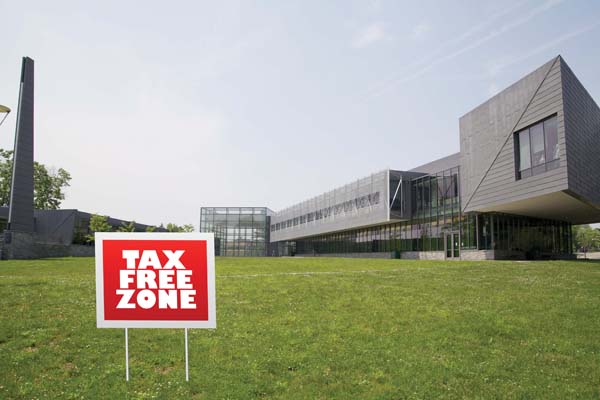Cuomo’s tax-free zones draw critics
As Gov. Andrew Cuomo continued to rally support from business, municipal and academic leaders for his proposed tax-free business zones on and around college campuses, critics have blasted the novel plan as more “corporate welfare” from “Governor 1 Percent” and an inadequate tax relief measure to spur upstate economic development.
Cuomo and administration officials have held a series of meetings with leaders in the public and private sectors to discuss goals and details of the Tax-Free NY initiative unveiled by the governor last month. It would offer 10-year state tax exemptions to job-creating businesses that lease space at the state”™s 57 SUNY campuses outside New York City and selected private universities north of Westchester County or at 20 other off-campus state properties.
The tax-free zones, which would foster working partnerships and technology transfers between schools and startup enterprises, relocating out-of-state businesses and expanding New York companies, also would include up to 200,000 square feet of commercial space within one mile of each state campus. Private universities collectively would be allotted a maximum of 3 million square feet of space for tax-free enterprise.
Eligible businesses would pay no sales, property and business or corporate taxes and their employees would be exempt from state income taxes for a decade.
Following Cuomo”™s June 3 sit-down with college presidents and members of the state”™s 10 regional economic development councils, SUNY Purchase President Thomas J. Schwartz was among those joining the growing public chorus of endorsements for Tax-Free NY.
“A venture than can link to and capitalize on the academic expertise of the campus, while adding value to the college as well as local communities, is one we would fully embrace,” Schwartz said in a statement from the governor”™s office. A Purchase-related tax-free community “would generate opportunity for highly creative, entrepreneurial and enterprising initiatives.”
Likely the plan”™s most vociferous critic to date, state Civil Service Employees Association President Danny Donohue said Cuomo”™s proposal would provide yet another tax giveaway to business at the expense of local communities and middle-class jobs.
“The governor doesn”™t get the fact that more corporate welfare is no answer to New York”™s economic challenges,” said Donohue. “No amount of TV ads spinning his record can change the reality that his so-called job creation policies have failed. They have mostly benefitted the super-wealthy and big corporations and repeatedly failed to deliver real growth and middle class jobs.”
“The Cuomo administration has very misplaced priorities,” Donohue said. “The governor has the money for the things that help his political agenda and his millionaire friends but he just doesn”™t give a fig about working people.”
“Gov. Cuomo truly deserves the nickname, ”˜Governor 1 Percent,”™” the CSEA president added.
At the Empire Center for New York State Policy in Albany, founder and senior fellow Edmund J. McMahon on his NY Torch blog said the governor”™s offer of full tax exemptions is “a broader and potentially more attractive incentive than the array of targeted tax credits the state offered in the past, while avoiding some of the more egregious abuses of the now-defunct Empire Zones program.”
McMahon added, though, that the Tax-Free NY plan is not enough “to give upstate the jolt it needs.”
“In the final analysis, highly touted ”˜economic development”™ programs built on a promise of significant tax relief ultimately beg the same question: if our taxes are such a hindrance to growth, why not reduce them for everyone?”
The policy analyst suggested “a more daring approach” would be to phase out the state corporate franchise tax entirely for all businesses operating in the 50-county upstate region.
“Sure, the ”˜tax free”™ promise should be enough to entice some firms into partnerships with some colleges and universities,” McMahon wrote. “But given the reams of red tape that will necessarily apply to projects in one of these relatively small zones, including the requirement that each project be tied to the mission of the college or university involved, the initiative is highly unlikely to generate growth on a game-changing scale.”
For businesses admitted to the tax-free zones, “Existing, taxpaying New York competitors of such companies won”™t be cheering,” McMahon said.
Economist Scott Drenkard at the Tax Foundation, a nonpartisan tax research group in Washington, D.C. , told The Post-Standard of Syracuse that he knew of no other state that sponsored tax-free zones where employees were exempt from income taxes.
“Carving out special tax breaks for certain favored businesses is destructive to the economic playing field,” Drenkard told the Syracuse newspaper. “A much better option in the long run is to go with broader tax bases and as low a tax rate as you can make while still maintaining necessary government services.”
At CSEA headquarters in Albany, Donohue said he was extremely concerned that state legislative leaders “seem ready to give the governor a blank check on this latest misguided venture.” The governor”™s initial announcement was accompanied by statements of support from Democratic and Republican leaders of the state Senate and Assembly.
Sen. Jeffrey D. Klein, co-leader of the Senate majority coalition whose 34th district includes parts of the Bronx and Westchester, called the tax-free zones “the next frontier” in the effort to attract “the best and fastest-growing companies” to New York in the “hyper-competitive global marketplace.”
A spokeswoman for the governor said Tax-Free NY legislation is being drafted and will be introduced in the current legislative session.
The session ends June 20. The spokeswoman said the governor wants to have the bill passed before lawmakers leave Albany.
